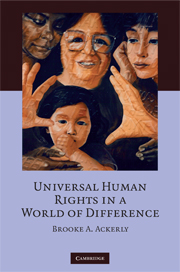Book contents
- Frontmatter
- Contents
- Acknowledgments
- 1 Universal human rights in a world of difference: challenging our thinking
- Part I Epistemology, diversity, and disagreement in theory and practice
- Part II A methodology for immanent theory
- 5 Feminist curb cutting: a methodology for exposing silences and revealing differences for the immanent study of universal human rights
- 6 Listening to the silent voices, hearing dissonance: a methodology for interpretation and analysis
- Part III Immanent universal human rights: theory and practice
- Bibliography
- Interviews
- Index
6 - Listening to the silent voices, hearing dissonance: a methodology for interpretation and analysis
Published online by Cambridge University Press: 06 July 2010
- Frontmatter
- Contents
- Acknowledgments
- 1 Universal human rights in a world of difference: challenging our thinking
- Part I Epistemology, diversity, and disagreement in theory and practice
- Part II A methodology for immanent theory
- 5 Feminist curb cutting: a methodology for exposing silences and revealing differences for the immanent study of universal human rights
- 6 Listening to the silent voices, hearing dissonance: a methodology for interpretation and analysis
- Part III Immanent universal human rights: theory and practice
- Bibliography
- Interviews
- Index
Summary
Introduction: theoretical analysis with methodology?
The purpose of applying curb cut feminist epistemology to developing the methodology for acquiring insights from activists in chapter 5 is to enable us to derive from women's human rights activists' actions and insights an immanent account of universal human rights. For those unfamiliar with women's activism, it may seem that such sources would obviously yield a singular view. For those familiar with women's activism, it may seem that drawing on women's human rights activists for immanent insights about universal human rights could not possibly lead to universal agreement because of the vast differences among such activists. In fact, despite the range of differences, a shared theory of universal human rights does emerge from immanent inquiry with women's activists. (As we will see, it is a theory according to which attentiveness to differences is necessary to know and secure human rights.)
The challenge of applying curb cut feminist epistemology to developing a methodology for analytical purposes is to be respectful and appreciative of the range of views yet not to let any particularly wellsaid or resonating accounts be offered as representative of the range of audible and inaudible views. Theorists can destabilize our epistemology by noticing that through our disciplinary training and practice, we are inclined to be seduced by a well-phrased and convincing argument. In this project, however, I need to take all arguments as data and develop analytical methods for thinking through all arguments. The methodology presented here requires theorists to be attentive to the ways that values, practices, and norms (while important subjects within our inquiry) work their magic on us too.
- Type
- Chapter
- Information
- Universal Human Rights in a World of Difference , pp. 154 - 194Publisher: Cambridge University PressPrint publication year: 2008



